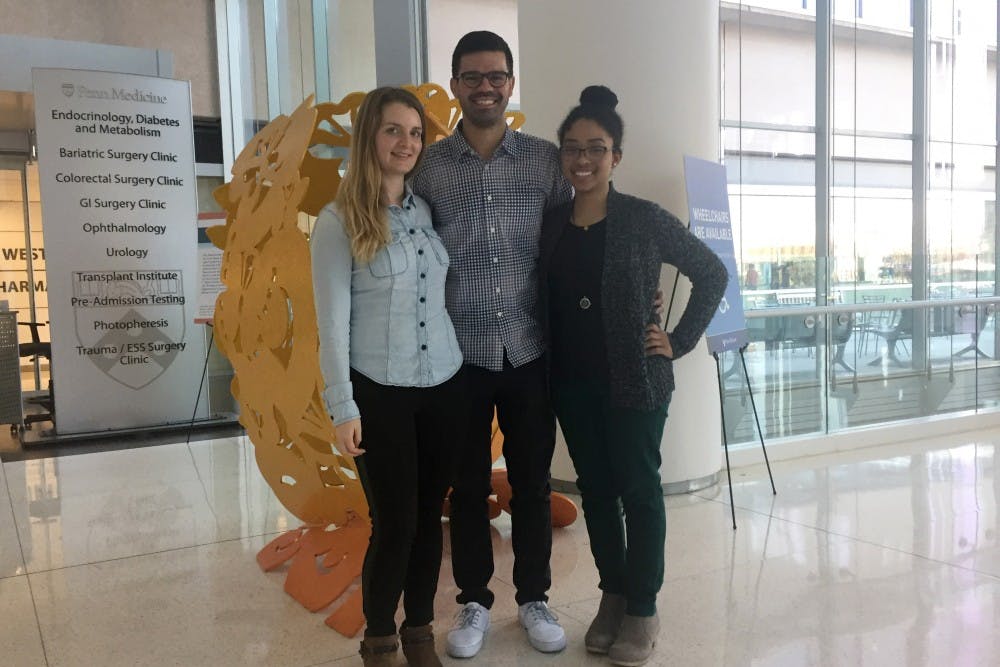
On Earth Day, April 22, Penn scientists plan to ditch their laboratories and take to the streets for the March for Science in Philadelphia.
The Philadelphia march, one of over 350 marches that will take place across the United States from Los Angeles to Washington, D.C., is intended to be a nonpartisan show of support for public policy based on scientific fact and a celebration of the role science plays in daily life. The march's leadership structure includes a Diversity and Inclusion Committee, which is led by four Penn students.
“What we want to show to the greater community is that we come in all races, religions, gender identities, sexual orientations, ability, socio-economic backgrounds, political perspectives and nationalities. You name it and it’s in science,” said Adrian Rivera-Reyes, a doctoral candidate in the Perelman School of Medicine who is a leader of the diversity committee.
Rivera stressed the importance of diversity in science. “This brings different opinions, different perspectives and different ideas which we know is critical for the scientific process which helps society as a whole,” he said.
Rivera has reached out to the deans of diversity and inclusion at Philadelphia colleges such as Drexel University, Temple University and Thomas Jefferson University to publicize the event.
School of Medicine doctoral candidate Julianne Rieders, another leader on the committee, said the committee is working to make the march inclusive in light of public criticism of other recent protests such as the Women’s March. Rieders attended the Women’s March in New York and thought the march was not inclusive of women of color.
The other two leaders of the committee are doctoral candidate Kevin Alicea-Torres, who is the president of Penn’s chapter of the Society for Advancement Chicanos/Hispanics and Native Americans in Science, and Medical student Dorothy Charles who is also an organizer for White Coats for Black Lives.
One of the main goals of the march is to improve the public’s faith in science. “We need to learn how to communicate effectively with non-scientists, which we have struggled a lot with in the past," Rivera said. "We are good communicators with ourselves, but we haven’t been great with generalizing these concepts and teaching people about what we do and why we do what we do.”
Many science-focused groups on campus such as Penn Education & Public Outreach in Physics and Astronomy are organizing students to attend. PEPOPA Program Coordinator and doctoral candidate Ashley Baker cited President Donald Trump’s perceived lack of support for the scientific community as a reason for her group's involvement. “The current administration seems to not give science credibility and we want our voices to be heard.” Baker said. Penn Eco-Reps Co-Coordinator and College junior Jisoo Kim has encouraged club members to attend as well.
Although the march is officially nonpartisan, some of the event’s leaders noted President Trump’s policies have been controversial in the scientific community. “Whenever an elected official proposes any sort of policy that is not based on facts, we as scientists will protest it," Rivera said. "Scientists will stand with facts, expose people and policy-makers to facts and suggest policy measures that are supported by facts.”
Rieders acknowledged that if President Trump had not been elected, the march may not have been held, but insists that better communication with the public is beneficial in any political climate.
“Maybe we wouldn’t [have organized the march], because scientists have traditionally not been political, but maybe we still should have,” Rieders said. “Communicating with the public is a good thing no matter who is in office and we can always improve in that way.”
The Daily Pennsylvanian is an independent, student-run newspaper. Please consider making a donation to support the coverage that shapes the University. Your generosity ensures a future of strong journalism at Penn.
Donate




